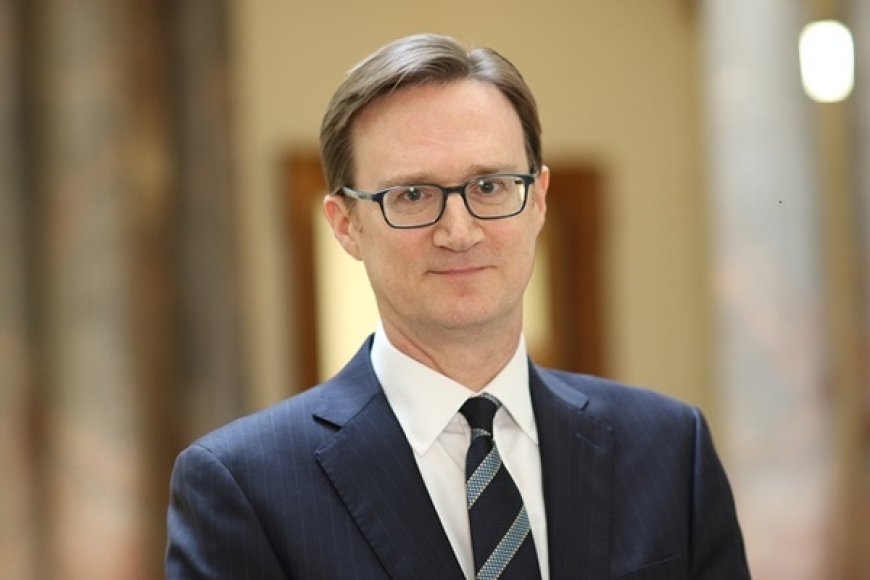UK envoy: Nigeria-UK N16tr current trade value highest ever

British High Commissioner to Nigeria, Richard Montgomery, says the trade value between Nigeria and Britain, which currently stands at 7.9 billion pounds (N16 trillion) has hit an unprecedented level.
Montgomery, who made this known in an interview on Wednesday in Abuja, said UK-Nigeria trade and investment relationships are currently being built on a post-Brexit set of rules that bolster trade ties with the potential for mutual economic benefits.
He said Nigeria is one of the countries that benefited the most from Britain’s exit from the European Union (EU), better known as Brexit.Montgomery said Brexit had allowed more Nigerians to come and live, work, and study in the UK, culminating in the number of diaspora Nigerians in the UK increasing from 300,000 in 2021 to 550,000 in 2025.“I’d say in relation to the Nigeria-UK relationship, Nigeria has been one of the biggest beneficiaries of Brexit in terms of our visa regime, which has allowed more Nigerians to come and live and work and study in the UK.“In 2021, we had an estimate that there were 300,000 people of Nigerian descent or nationality in the UK, a diaspora of 300,000, and now that has risen to 550,000.
“The diaspora from Nigeria has increased partly because of the post-Brexit immigration regime. So, Nigeria has been a big beneficiary of Brexit,” he said.
The British envoy explained that following Britain’s exit from Europe, the UK has had realignment in its economic relationships and freedom to do trade deals with wider countries outside the EU.
“So, Brexit is something that has caused a realignment in a lot of our economic relationships and some of those may look positive and some of them may look negative.
“I think that overall, UK has a lot more, if you like, independence and freedom to do trade deals with wider countries outside EU.
“At the moment I’d say the most obvious example is that our relationship with the U.S. is particularly constructive and is leading to these massive U.S. investments in the UK because of the economic freedoms enabled by Brexit,” he said.
Montgomery lauded the UK-Nigeria Enhanced Trade and Investment Partnership (ETIP), which he said boosts trade relations by removing non-tariff trade and investment barriers to foster cooperation in priority sectors.
According to him, the ETIP, which also promotes collaboration with the Developing Countries Trading Scheme (DCTS), would scale the trade value by providing generous trading terms and tariff reductions on Nigerian products.
“So, I’m really delighted at our most recent trade figures. The 7.9 billion pounds or N16 trillion trade is the highest that it’s ever been between the UK and Nigeria. And so, it’s a very positive trajectory.
“The enhanced Trade and Investment Partnership (ETIP) is exciting because it’s a mutually agreed set of sectors and issues on which the UK and Nigeria government are going to work on.
“It’s happening under the umbrella of our respective ministers, the federal minister of industry, investment and trade, and the UK business and trade minister,” he said.
He added: “The exciting thing about ETIP is, and you’ve used the word leverage, that’s precisely right.
“It identifies through mutual agreement the areas that the UK feels it has a comparative advantage in and the areas that Nigeria wants to create more economic opportunities in.”
Montgomery said the UK was not competitive in all sectors, but has major advantages in various sectors, including the financial services, new technology, financial technology, artificial intelligence and other digital platforms.
The British envoy said that in the creative economy, his country has some advanced manufacturing and advanced energy solutions, which are worth looking at, and credible in the Nigerian context.
He said the UK was doing a lot in higher education investments in the Nigerian education sector, as well as in the agricultural sector to boost Nigeria’s agricultural exports, considering its high potential.
“So, the ETIP identifies these priorities and we have ways of following up in each sector with the businesses and the government agencies on both sides that can unlock more investment and growth.
“The aim is mutual growth, it’s creating jobs in both our countries, and that’s why it’s really important that we realise that ETIP is mutually agreed and negotiated, it’s in both our interests,” he added.









